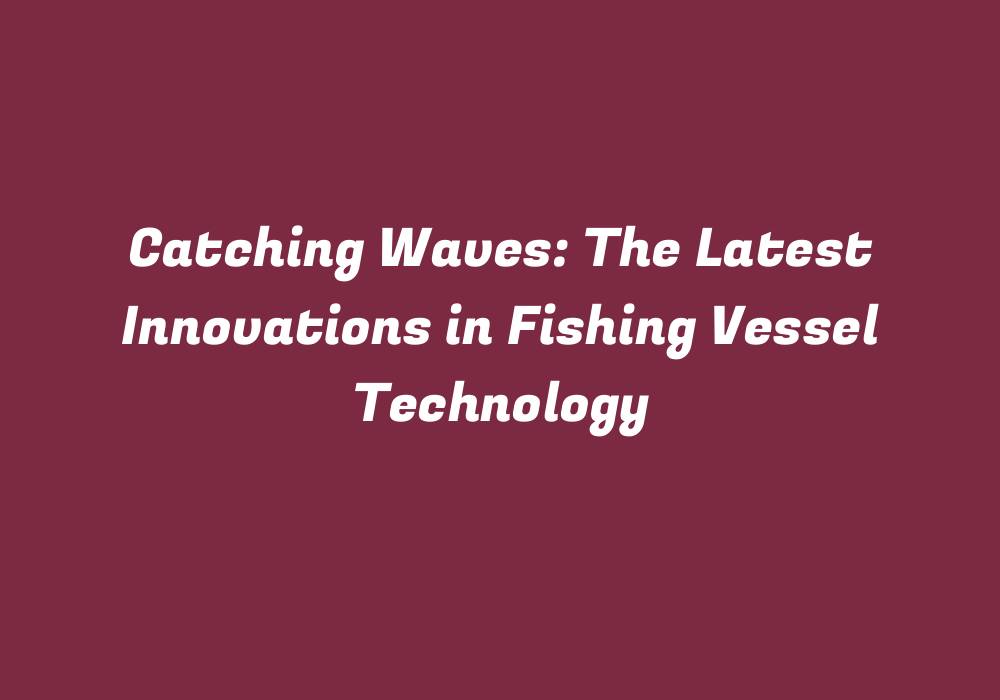Catching Waves: The Latest Innovations in Fishing Vessel Technology
Introduction
In the constantly evolving world of technology, several industries have been revolutionized. One such area where there has been significant advancement is the field of fishing vessel technology. These vessels are a key part of sustaining our food supply and ensuring that communities across the globe receive essential nutrition. The latest innovations in this sector aim to improve efficiency, safety, sustainability, and even communication. In this article, we will take an in-depth look at some of the most cutting-edge developments shaping the future of fishing vessel technology.
Automation and Artificial Intelligence
One area where technological advancements have had a profound impact is on board automation and artificial intelligence (AI) systems. These intelligent systems are designed to assist crew members in various tasks such as navigating, monitoring fish stocks, optimizing fuel efficiency, and ensuring the safety of crew and vessels. By incorporating AI into fishing vessel technology, it allows for more precise data collection, real-time decision making, and effective management of onboard resources.
Enhanced Sustainability
Sustainable fishing practices are crucial to maintaining the health of our oceans. With this in mind, many innovations have been developed to reduce the ecological footprint of fishing vessels and minimize negative impacts on marine life. For example, several companies have introduced eco-friendly propulsion systems that maximize fuel efficiency while minimizing underwater noise pollution. Other advancements include using renewable energy sources such as solar or wind power for auxiliary operations like refrigeration, communication, and other onboard necessities.
Improved Navigation and Safety
Fishing vessels often venture into remote areas with challenging weather conditions and limited connectivity to the shore. New technologies are being developed to enhance safety while at sea by providing real-time updates on weather, ocean currents, and potential hazards that may affect their journeys. Furthermore, satellite communications and GPS systems enable seamless connectivity with coastal facilities for more efficient route planning, emergency response, and remote monitoring of essential vessel components.
Innovative Fishing Methodologies
Traditional fishing techniques have evolved alongside the development of innovative technology. For instance, some vessels are now equipped with advanced sonar systems that assist fishermen in locating and targeting specific fish species more accurately. This results in a more targeted approach to fishing, reducing bycatch (incidental capture of non-targeted marine organisms) and overall resource waste.
Moreover, several new technologies have been introduced to improve the efficiency and sustainability of various types of fishing nets, such as those designed for trawling or long lining. These improvements not only minimize environmental impacts but also help reduce bycatch and save on fuel costs during retrieval operations.
Advancements in Vessel Design
The design of modern fishing vessels has been optimized to make the most of these technological innovations while enhancing crew safety, productivity, and overall performance. For instance, some vessels now feature advanced hull designs that are more aerodynamic and hydrodynamic, leading to increased fuel efficiency and lower greenhouse gas emissions. Furthermore, new vessel structures are designed to minimize noise pollution and reduce environmental impacts during construction.
In summary, the future of fishing vessel technology is a promising one, driven by innovations in automation, sustainability, navigation, safety, and improved fishing methods. As the industry continues to evolve, these advancements will undoubtedly lead to more efficient and eco-friendly practices that not only benefit commercial interests but also ensure the preservation of our marine ecosystems for generations to come.
